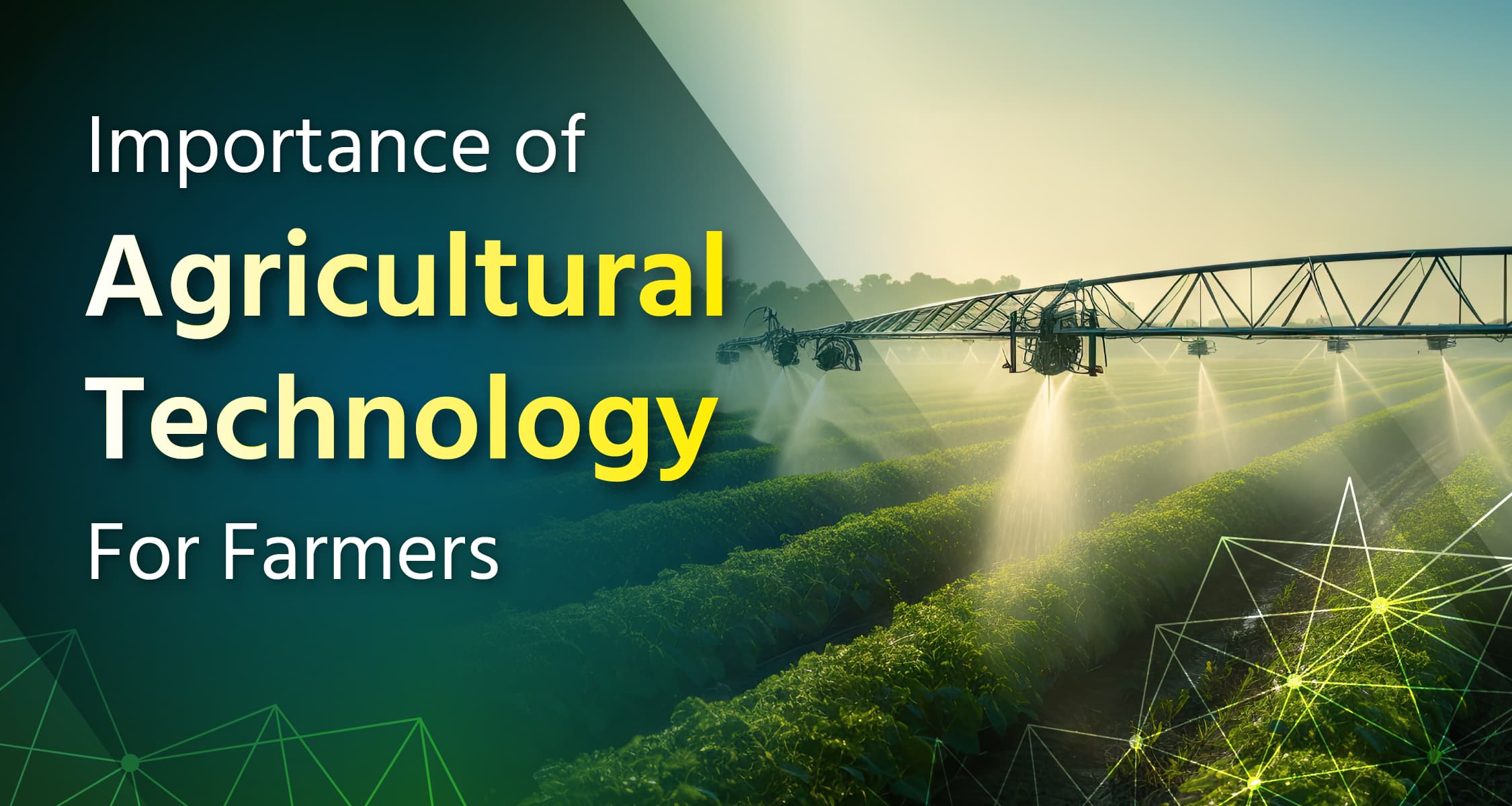Importance of Agricultural Technologies for Farmers

Technical innovations in agriculture have become a requisite in the current scenario. As we can observe, the demand for food is growing substantially every day due to the population explosion across the globe. Mechanical solutions like tractors and semi-automatic harvesters were introduced in the late 20th century. Similarly, for the past few years, new technological innovations have been tested and implemented in agriculture such as drones, digital twin, smart greenhouses, etc. These innovations have become quite an important affair for countries to swiftly adapt and implement as these are the ways that can help farmers multiply their yield and enhance their produce quality. If fully adopted in India, these technologies have the potential to revolutionize the agricultural sector, promoting smart farming practices across all states. They can enable farmers to achieve optimized yields by efficiently utilizing inputs and labor. Ultimately, this can lead to better prices for their produce, increasing profitability for farmers when they sell their crops in the market.
Modern Technologies Used in Agriculture
- Smart Greenhouse: A smart greenhouse is an artificial setup where plants are provided with suitable climatic conditions for their proper growth and production in any area with simulated weather conditions. With the help of this technology, parameters such as temperature, humidity, moisture, light intensity, etc., can be controlled according to the needs of the plants. Modern sensors and smart communication technologies in smart greenhouses assist in monitoring plants continuously, adjusting inputs, and making the process efficient. This technology offers several other benefits as well. It allows us to obtain accurate information about crop health while cultivating. From a security perspective, this technology proves to be very helpful. Smart greenhouses are equipped with CCTV cameras, smart door locks, and other sensors at all times. These security devices are connected to alarms that become active upon detecting suspicious or unauthorized activities inside the smart greenhouse.
- Drones in Agriculture: A drone is a flying machine controlled by a remote and powered by rechargeable batteries. Speaking of the benefits of drones in the agricultural sector, they can capture photos of fields, spray fertilizers and pesticides, transport items from one place to another, and accomplish many tasks efficiently in minimal time and effort. By using drones, farmers can inspect their fields and crops at their fingertips. The use of drones eliminates the need for laborers to spray fertilizers and pesticides, thus reducing labor costs. Uniform application of fertilizers and pesticides on crops also increases productivity. Drones save a lot of time in various agricultural tasks. It is important to pay special attention to wind direction when using drones. However, drones are quite costly and it becomes difficult for farmers as they have to invest heavily in the initial stages. Hence, the usage of drones in India has not been adopted full-fledged, and pilot projects are running in many regions.
- Robotics in Agriculture: Using robotic technology in agriculture proves to be helpful in advancing our agricultural system. Robots assist in tasks ranging from sowing seeds to caring for and managing crops. When necessary, they can also apply pesticides and fertilizers. They can irrigate crops according to the moisture content in the soil. Additionally, they are helpful in transporting goods from one place to another. The use of robots in agriculture saves farmers time, energy, and labor, allowing them to focus on other agricultural activities to achieve higher productivity. However, this can be quite costly and it becomes difficult for farmers as they have to invest heavily in the initial stages. Hence, its usage in India has not been adopted full-fledged, and pilot projects are running in many regions.
- Automation in Fields: Farm automation is a technical process in the agricultural sector where modern technology is utilized to automate various agricultural tasks. It involves the use of various automated machines, equipment, and software. Through farm automation technology, farmers can utilize machines to automate various agricultural tasks, resulting in saving time and labor. By utilizing tools such as sensors and data collection devices, farmers can obtain accurate information about the condition of their fields and make important decisions for crops by analyzing it, including factors such as crop health, irrigation requirement, the need for fertilizers and pesticides, as well as weather and climate information. This makes it easier to increase productivity and improve the quality of crops.
- Digital Twin: Digital twin is emerging as an important and modern technology in the agriculture sector. This technology is being used in agriculture to digitally represent the entire chain of farming production. It provides farmers with a new way to understand and improve the condition of their fields. By creating virtual replicas of each animal through this modern technology, farmers can obtain real-time information about the health, nutrition status, etc., of their animals. Farmers can view the condition of their fields on a personal dashboard. This enables them to know about the weather, soil quality, water availability, etc., and irrigating and using fertilizers at the right time. This modern technology also provides information about the status and maintenance of agricultural machinery along with showing the status of agricultural machinery. Additionally, it can be helpful in the context of various natural disasters, such as identifying potential damages from rainfall, excessive cold, or excessive temperatures in advance and assisting in taking appropriate steps. Digital twin can automate tasks such as sowing dates, irrigation, and harvesting dates, which can help farmers manage their farming more efficiently.
Have you ever used any of these modern technologies while cultivating? Share your answer and experience with us in the comments. For more information on modern technologies in agriculture, follow the 'Krishi Tech' channel now. Also, don't forget to like and share this post.
Frequently Asked Questions (FAQs)
Q: Which modern technologies are used in agriculture?
A: Several modern technologies are being used in the field of agriculture, including greenhouse technology, drones, robots, soil moisture sensors, farm automation, geo-tagging, digital twin, and so on. However, some of these technologies are not yet fully prevalent in India.
Q: Why is modern technology important in agriculture?
A: Modern technology is very important in agriculture. Through these technologies, we can obtain accurate information about the weather, control pests and diseases, and gain proper knowledge about soil moisture and nutrients, leading to increased productivity and quality of crops.
Q: How does the use of modern technology in farming impact the environment?
A: The use of modern technology in farming has several positive impacts on the environment. Some of the major ones include reduced soil erosion, water conservation through efficient irrigation, reduced use of harmful chemicals, better health of soil, and so on.
जारी रखने के लिए कृपया लॉगिन करें

फसल चिकित्सक से मुफ़्त सलाह पाएँ
